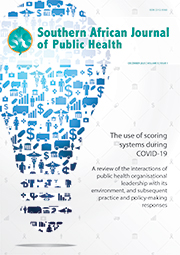Research

Home delivery of medication as part of reducing congestion in primary healthcare in Tshwane District Health Services
Abstract
Background. Congestion at health facilities poses the risk of extensive spread of the severe acute respiratory syndrome coronavirus 2 (SARSCoV-2) to patients at high risk for severe illness and death due to this infection. During the lockdown to control the spread of the virus, many patients with chronic conditions are not visiting health facilities and not collecting their chronic medication. To improve adherence to medication, home delivery of medication was instituted for patients with chronic diseases who had been receiving care at the Skinner Street Clinic in Tshwane.
Objective. To support patients with chronic diseases who were unable to collect their medication, by remotely consulting (telehealth) and delivering their medication during the lockdown due to the COVID-19 pandemic.
Methods. Patients were identified for potential home delivery of medication from the clinic appointment book. Their files were retrieved, and they were telephoned and offered the option of receiving medication through home delivery instead of attending a health facility. For those who qualified and accepted home delivery, files were sent to the clinic pharmacy. Medication parcels were prepared and sent to ward-based outreach teams to deliver to patients. Relevant information was captured on the Qualtrics platform.
Results. A total of 1 727 files were evaluated. Of these patients, 60% were on treatment for HIV infection, and 19% for hypertension. A total of 32% (n=547) were eligible for home delivery of medication, but only 25% of the 1727 patients accepted the home delivery of medication. Almost 25% could not be contacted. Compared with those with non-communicable diseases (NCDs) or a combination of HIV and one or more NCDs, a higher proportion of HIV-positive patients with no other diagnosis chose not to have their medication delivered at home. Patients using the service expressed their appreciation and requested that it be extended to others.
Conclusion. Home delivery of medication has significant advantages for patients. It can ensure that patients continue to adhere to their chronic medication in the midst of the COVID-19 epidemic, without increasing their risk of contracting the virus. Expanding the home delivery of medication to more facilities while aligning it with the Centralised Chronic Medicine Dispensing and Distribution programme has the potential to alleviate the congestion and workload of primary care facilities while these are under severe pressure owing to the COVID-19 pandemic.
Authors' affiliations
J M Louw, Department of Family Medicine, School of Medicine, Faculty of Health Sciences, University of Pretoria, South Africa
B Rantloane, Tshwane District Health Services, Gauteng Department of Health, South Africa
S Ngcobo, Department of Family Medicine, School of Medicine, Faculty of Health Sciences, University of Pretoria, South Africa
Z Brey, Global Health Senior Program Officer, Bill and Melinda Gates Foundation, Johannesburg, South Africa
J Hugo, Department of Family Medicine, School of Medicine, Faculty of Health Sciences, University of Pretoria, South Africa
D Basu, Department of Public Health Medicine, Steve Biko Academic Hospital and University of Pretoria, COPC Research Unit, Department of Family Medicine, Faculty of Health Sciences, University of Pretoria, South Africa
J Wishnia, Centre for Health Policy, School of Public Health, Faculty of Health Sciences, University of the Witwatersrand, Johannesburg, South Africa
C Christian, Department of Economics, University of the Western Cape, Cape Town, South Africa
M Pitsi, Tshwane District Health Services, Gauteng Department of Health, South Africa
M Makhudu, Tshwane District Health Services, Gauteng Department of Health, South Africa
S Seane, Health and Social Development Department, City of Tshwane Metropolitan Municipality, South Africa
M Lukhele, Gauteng Department of Health, Johannesburg, South Africa
Full Text
Cite this article
Article History
Date published: 2020-08-14
Article Views
Full text views: 2686

.jpg)


Comments on this article
*Read our policy for posting comments here